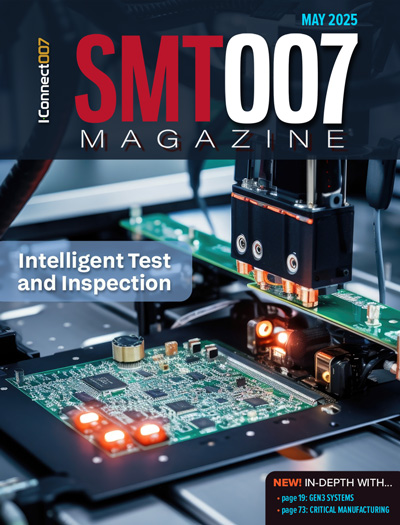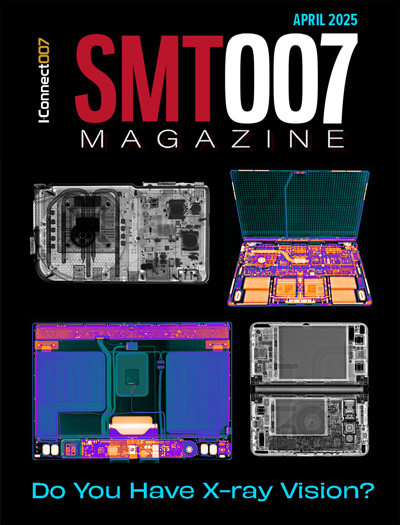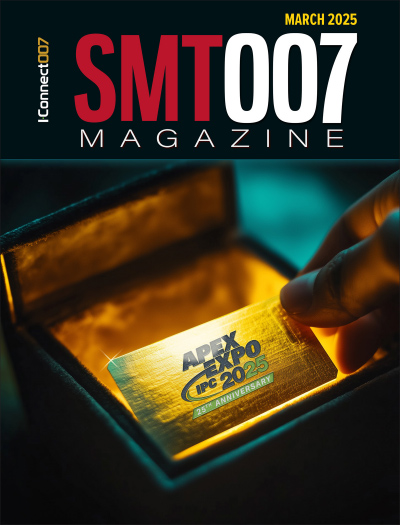-

-
News
News Highlights
- Books
Featured Books
- smt007 Magazine
Latest Issues
Current Issue
Intelligent Test and Inspection
Are you ready to explore the cutting-edge advancements shaping the electronics manufacturing industry? The May 2025 issue of SMT007 Magazine is packed with insights, innovations, and expert perspectives that you won’t want to miss.

Do You Have X-ray Vision?
Has X-ray’s time finally come in electronics manufacturing? Join us in this issue of SMT007 Magazine, where we answer this question and others to bring more efficiency to your bottom line.

IPC APEX EXPO 2025: A Preview
It’s that time again. If you’re going to Anaheim for IPC APEX EXPO 2025, we’ll see you there. In the meantime, consider this issue of SMT007 Magazine to be your golden ticket to planning the show.
- Articles
- Columns
Search Console
- Links
- Media kit
||| MENU - smt007 Magazine
SEMI Energy Collaborative Releases Recommendations for Building Low-Carbon Energy Supply in Singapore
February 27, 2025 | SEMIEstimated reading time: 2 minutes
The SEMI Energy Collaborative publicly released its analysis and report: Challenges and Potential Solutions for Acceleration of Low-Carbon Energy Deployment in Singapore. Now available for download, the report combines input from SEMI and its Energy Collaborative sponsors and suggests solutions for policymakers, low-carbon energy (LCE) developers, and semiconductor industry companies to further increase the pace and scale of access.
The report references the International Energy Agency, noting that as global tech giants and other companies set net-zero emission targets for their growing operations and supply chains, Singapore needs to expand its access to LCE to meet environmental needs and maintain the global competitiveness of its export industries. Singapore’s semiconductor industry contributes more than 9% of the nation’s GDP and 11% of the global chip output. By 2035, Singaporean companies aim to adopt 21 to 26 TWh of LCE annually, approximately 30% of the country’s total power consumption. However, it is difficult for companies to source the LCE they need, and future projections indicate challenges.
The Energy Collaborative has identified six key areas of LCE policy-related actions for Singapore. Each recommendation is supported by detailed analysis of current and historical market conditions. In summary, the EC recommends the following strategies for scaling up LCE adoption:
- Signing an energy import declaration with neighboring countries
- Expanding the role of Singapore’s transmission system operator (TSO) to include ownership of electricity import infrastructure
- Establishing a “one-stop shop” for import plan permits
- Leveraging the Future Energy Fund to support the adoption of low-carbon alternatives
- Maximizing Singapore’s solar potential and providing outlook certainty
- Developing a robust ASEAN green hydrogen ecosystem to satisfy the long-term clean energy needs for Singapore
“SEMI and our Energy Collaborative sponsors recently presented our recommendations to the Singapore Ministry of Trade & Industry, as well as the Energy Market Authority, and engaged in very productive discussions,” said Dr. Mousumi Bhat, Vice President, SEMI Global Sustainability. “Alongside key members of the semiconductor value-chain, we will continue to hold regular dialogues to explore progress and new opportunities to expand LCE in the Republic of Singapore.”
The Energy Collaborative aims to reduce global semiconductor ecosystem carbon emissions as well as understand and clear regulatory and market-based roadblocks that hinder installing and procuring low-carbon energy sources in the Asia-Pacific region. The Energy Collaborative partners with civil society and other organizations which share similar objectives to leverage expertise and strengthen the voices calling for expanded access to LCE.
Suggested Items
Forge Nano Secures $40M to Scale U.S. Battery Manufacturing and Commercial Semiconductor Equipment Businesses
05/02/2025 | Forge NanoForge Nano, Inc., a technology company pioneering domestic battery and semiconductor innovations, announced the successful close of $40 million in new funding.
Hikrobot Integrates Wiferion Technology Into AMRs
04/30/2025 | HikrobotIn the automotive industry, every second counts. AMRs have to work without interruption - charging breaks mean less productivity. Hikrobot, one of the world's leading providers of mobile robotics, therefore relies on Wiferion's wireless charging technology, which has already established itself as the standard in the industry.
Hikrobot Integrates Wiferion Technology into AMRs
04/29/2025 | WiferionIn the automotive industry, every second counts. AMRs have to work without interruption - charging breaks mean less productivity. Hikrobot, one of the world's leading providers of mobile robotics, therefore relies on Wiferion's wireless charging technology, which has already established itself as the standard in the industry.
CCL Design, Ynvisible Announce Strategic Partnership to Deliver Scalable Printed Display Solutions
04/28/2025 | CCL DesignCCL Design will integrate Ynvisible's proprietary display technology into its global manufacturing infrastructure and technology portfolio.
Candor Elevates PCB Fabrication Services with Continued Facility Upgrades
04/28/2025 | Candor CircuitsOntario-based circuit board manufacturer, Candor Circuit Boards has recently completed a series of facility upgrades to improve their PCB offerings. These investments will allow Candor to provide higher volumes of complicated boards more efficiently with better yield. The new technology has allowed the company to take on exciting high technology projects and collaborations in industries such as Military and Aerospace, Medical, Energy and more.


